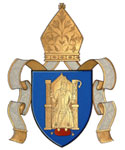 |
 |
News
Views on St. Patrick to ‘make history talk’

Attending the talk on St. Patrick.
The life of St. Patrick and the Ireland that he brought the Gospel to, were brought to life at a public event supported by local churches and Fermanagh Grand Orange Lodge.
The speakers were the Church of Ireland Bishop of Clogher, Right Revd John McDowell and Bishop Joseph Duffy, retired Roman Catholic Bishop of Clogher.
The event, “St. Patrick: an inspiration for all?” was organised by the Church of Ireland Clogher Diocese, the Methodist Church and Presbyterian Church locally and County Fermanagh Grand Orange Lodge and was the latest in a series of public events designed to promote helpful discussion on important issues.
The meeting in the Killyhevlin Hotel was well supported.
Introducing the evening, Mr Stuart Brooker, past County Grand Master of Fermanagh Grand Orange Lodge, explained how they had previously examined the Decade of Centenaries, the Ulster Covenant, Battle of the Somme and the Easter Rising.
About this latest event, he said; “Although we share differences, we all have a part to play in Northern Ireland. He said an inaugural St. Patrick’s Day service in Maguiresbridge Church of Ireland had been well supported.
Chairing the evening was Revd Earl Storey, who said they were tying to make history talk.
The first speaker, Bishop McDowell, told the audience that only two documents survive (neither of them in the original) which historians can say without hesitation were written by Patrick.
“Neither of them is very long and in fact one of them is short letter; The Confession and the Letter to the Soldiers of Coroticus,” he explained.
He described it as a paradox that most people in history would know the basic facts of someone’s life, such as the date and place of birth and when they died, possibly where they were educated or who the most important people were in their lives. But for such people they often knew next to nothing about their inner life, how they felt about other people or how they reacted to suffering.
“With Patrick it’s the exact opposite. We don’t know with any certainty when or where he was born or educated. But we do know lots about his inner life because he wrote it down in the explanation and justification for his life which he called his Confession.
“You might say we know a lot about what would nowadays be called Patrick’s ‘spirituality’; how he related to God. And it is very personal because Patrick had very clear and definite ideas about what God’s plan was for the world and where he (Patrick) fitted into it.”
Bishop McDowell said Patrick would have thought himself as a stranger in Ireland.
“In order to preach the Gospel, Patrick in direct quotations from Scriptures (in this case from Sirach and Mark’s Gospel) says he is prepared to suffer ‘the hatred of the wanderer’ to preach the Gospel to the ‘ends of earth.’
Bishop McDowell quoted Patrick as having written; “It is a bitter thing to be homeless and as long as you are in your own home you don’t have to bear the hatred that is healed upon the stranger.
The Bishop said; “And that homesickness and suffering is a recurring theme in the Confession and the Letter. Patrick repeatedly notes that he has left his parents and his friends and his homeland for the sake of the Gospel. He talks about being held in contempt and having to forage for food. He complains about being betrayed by those close to him and having plots hatched against him. “He is brought before his own religious leaders to be censured and also before foreign kings (Irish chieftains) to be humiliated. All consistent with what is foretold in Mark 13 for a preacher. And all this is explained by one word which Patrick uses often ‘Grace.’ Grace which has a rather sterner meaning for him than for us. To Patrick it meant simply God’s will. For it was Grace, not his own choosing, which had sent him to Ireland and had been both the cause and the medicine of his suffering.Bishop Joseph Duffy, who retired as Roman Catholic Bishop of Clogher in 2010 wrote a book “Patrick in His Own Words’ 50 years ago, which has been reprinted many times since.
At the talk, Bishop Duffy, regarded as a noted authority on Patrick, examined the Ireland that he visited.
He explained how his interest in Patrick began when visiting Lough Derg and where before he became Bishop, he was chaplain to the pilgrims at St Patrick’s Purgatory there for 10 years.
He said his interest in Patrick took him to many places to speak including, he recalled, addressing clergy at Portora Royal School in the 1970’s
“It’s the appreciation that Patrick was not just a Roman Catholic product, that he belonged to everyone, that he reached across the divide.
“Patrick to me was a very real person,” he said.
Describing the people to whom he came across in Ireland, Bishop Duffy said they spoke a celtic language but were either described as Hibernicas or Scot Gaels, the latter who spoke the gaelic of today.
He said there would have been about 500,000 people living on the island then in a tribal society where groups of families were together and had a king and did not live in towns and villages but in isolated areas.
Livestock were by far the most important wealth in the countryside and Patrick came as a stranger to make Christians out of the Irish.
The event was supported by Fermanagh and Omagh District Council, Department of Foreign Affairs and Trade as well as the Centre for Studies in Irish Protestantism (Maynooth University).